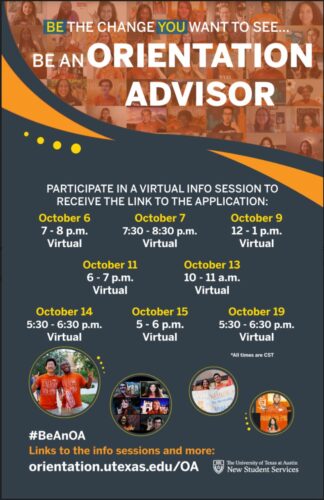New Student Services is recruiting Orientation Advisors (OAs) for the 2021 orientation season and we would like your help.
OAs support new freshman and transfer students as they transition to The University of Texas at Austin and are among the first people new students and families meet in their Longhorn journey. To prepare for this important role, OAs gain extensive leadership development and valuable work experience that serve them throughout their time at UT and beyond. They also learn valuable academic advising skills, engage in thoughtful discussions, write and perform in productions, develop creative media, plan large-scale events and much more.
This past summer, even amidst the adjustments due to COVID-19, our Orientation Advisors successfully led through the changes, fostering an environment of welcome and spirit through the online orientation program. Orientation Advisors are a very important ingredient to UT’s Orientation, and their work to transition and support new students will continue no matter the format of the Orientation program.
We want to build a team of diverse, talented and committed students who will represent the university well as they assist us with welcoming our newest Longhorns to UT Austin. If you know a student who has the potential to be an outstanding OA, please encourage them to attend one of the eight required OA Information Sessions occurring from Oct. 6-19 at varying times via Zoom. Students from any college and classification are eligible to become an Orientation Advisor.
You may also make a formal recommendation to New Student Services here: https://utexas.qualtrics.com/jfe/form/SV_6mmkM5f4IzQJRM9.
Students MUST attend one of the following OA Information Sessions to receive an application:
- Tuesday, Oct. 6, 7:00-8:00 p.m., https://utexas.zoom.us/j/93236805664
- Wednesday, Oct. 7, 7:30-8:30 p.m., https://utexas.zoom.us/j/98470432439
- Friday, Oct. 9, 12:00-1:00 p.m., https://utexas.zoom.us/j/98737207290
- Sunday, Oct. 11, 6:00-7:00 p.m., https://utexas.zoom.us/j/93946506555
- Tuesday, Oct. 13, 10:00-11:00 a.m., https://utexas.zoom.us/j/94515614578
- Wednesday, Oct. 14, 5:30-6:30 p.m., https://utexas.zoom.us/j/93230994637
- Thursday, Oct. 15, 5:00-6:00 p.m., https://utexas.zoom.us/j/97472092612
- Monday, Oct. 19, 5:30-6:30 p.m., https://utexas.zoom.us/j/93589367316
For more information and to see the job description, visit orientation.utexas.edu/OA. You can also follow Texas Orientation on Twitter and Instagram at @utorientation and on Facebook at https://www.facebook.com/utorientation/.

